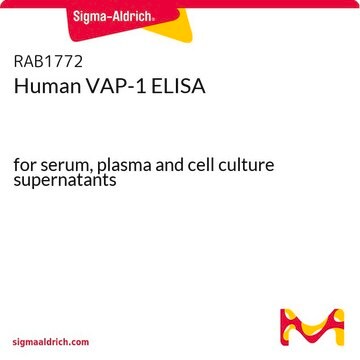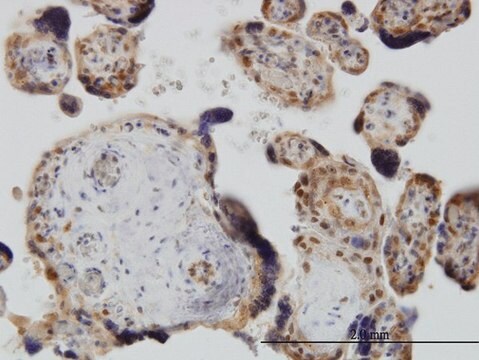SRP3295
VAP-1 human
recombinant, expressed in CHO cells, ≥95% (SDS-PAGE), ≥95% (HPLC)
Sinónimos:
AOC3, HPAO, SSAO
Iniciar sesiónpara Ver la Fijación de precios por contrato y de la organización
About This Item
Código UNSPSC:
12352202
NACRES:
NA.32
Productos recomendados
origen biológico
human
recombinante
expressed in CHO cells
Análisis
≥95% (HPLC)
≥95% (SDS-PAGE)
formulario
lyophilized
mol peso
80.0-90.0 kDa
envase
pkg of 10 μg
impurezas
<0.1 EU/μg endotoxin, tested
color
white
Nº de acceso UniProt
Condiciones de envío
wet ice
temp. de almacenamiento
−20°C
Información sobre el gen
human ... AOC3(8639)
Descripción general
VAP-1 is a type II membrane cell adhesion protein belonging to the copper/topaquinone oxidase family. Recombinant VAP-1 is a mixture of monomeric and disulfide linked homodimeric forms of a 737 amino acid polypeptide corresponding to amino acids 27 to 763 of the VAP-1 precursor. The gene AOC3 (amine oxidase, copper containing 3) encodes a 170kDa homodimeric sialylated glycoprotein, VAP-1 (vascular adhesion protein-1), that is abundantly expressed in high endothelial venules (HEV) of peripheral lymph nodes. It is expressed in capillaries of non-lymphatic human tissues, such as kidney and heart. It is also expressed on on adipocytes, dendritic cells and smooth muscle cells.
Acciones bioquímicas o fisiológicas
The protein VAP-1 (vascular adhesion protein-1) belongs to the group of semicarbazide sensitive amine oxidases (SSAO) that catalyze the formation of reactive oxygen species. It is a unique adhesion molecule that participates in inflammatory leukocyte recruitment in blood vessels. It functions in leukocyte extravasation to inflamed tissues. In the human eye, it has been associated with ocular inflammatory diseases, such as uveitis, age-related macular degeneration, and diabetic retinopathy. Its expression has been observed to be altered in several diseases, such as rheumatoid arthritis, diabetes, and atherosclerosis.
Forma física
Lyophilized from 10 mM Sodium Phosphate, pH 7.8.
Reconstitución
Centrifuge the vial prior to opening. Reconstitute in water to a concentration of 0.1-1.0 mg/mL. Do not vortex. This solution can be stored at 2-8°C for up to 1 week. For extended storage, it is recommended to further dilute in a buffer containing a carrier protein (example 0.1% BSA) and store in working aliquots at -20°C to -80°C.
Código de clase de almacenamiento
10 - Combustible liquids
Clase de riesgo para el agua (WGK)
WGK 3
Punto de inflamabilidad (°F)
Not applicable
Punto de inflamabilidad (°C)
Not applicable
Certificados de análisis (COA)
Busque Certificados de análisis (COA) introduciendo el número de lote del producto. Los números de lote se encuentran en la etiqueta del producto después de las palabras «Lot» o «Batch»
¿Ya tiene este producto?
Encuentre la documentación para los productos que ha comprado recientemente en la Biblioteca de documentos.
VAP-1-mediated M2 macrophage infiltration underlies IL-1?- but not VEGF-A-induced lymph- and angiogenesis.
Nakao S
The American Journal of Pathology, 178, 1913-1921 (2011)
A J Gearing et al.
Immunology today, 14(10), 506-512 (1993-10-01)
The demonstration of soluble isoforms of adhesion molecules has added a layer of complexity of our understanding of lymphoid-endothelial cell interactions. This is especially true in the light of observations which show levels of these isoforms to be raised during
Lama Almulki et al.
Experimental eye research, 90(1), 26-32 (2009-09-19)
Recently we showed a critical role for Vascular Adhesion Protein-1 (VAP-1) in rodents during acute ocular inflammation, angiogenesis, and diabetic retinal leukostasis. However, the expression of VAP-1 in the human eye is unknown. VAP-1 localization was therefore investigated by immunohistochemistry.
Nuestro equipo de científicos tiene experiencia en todas las áreas de investigación: Ciencias de la vida, Ciencia de los materiales, Síntesis química, Cromatografía, Analítica y muchas otras.
Póngase en contacto con el Servicio técnico








